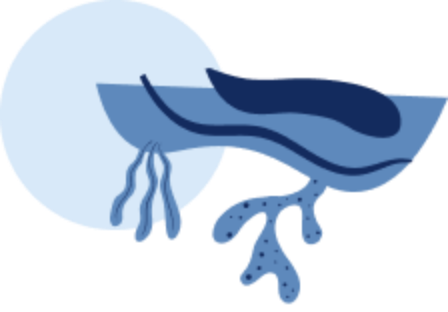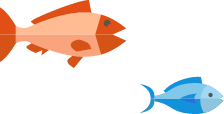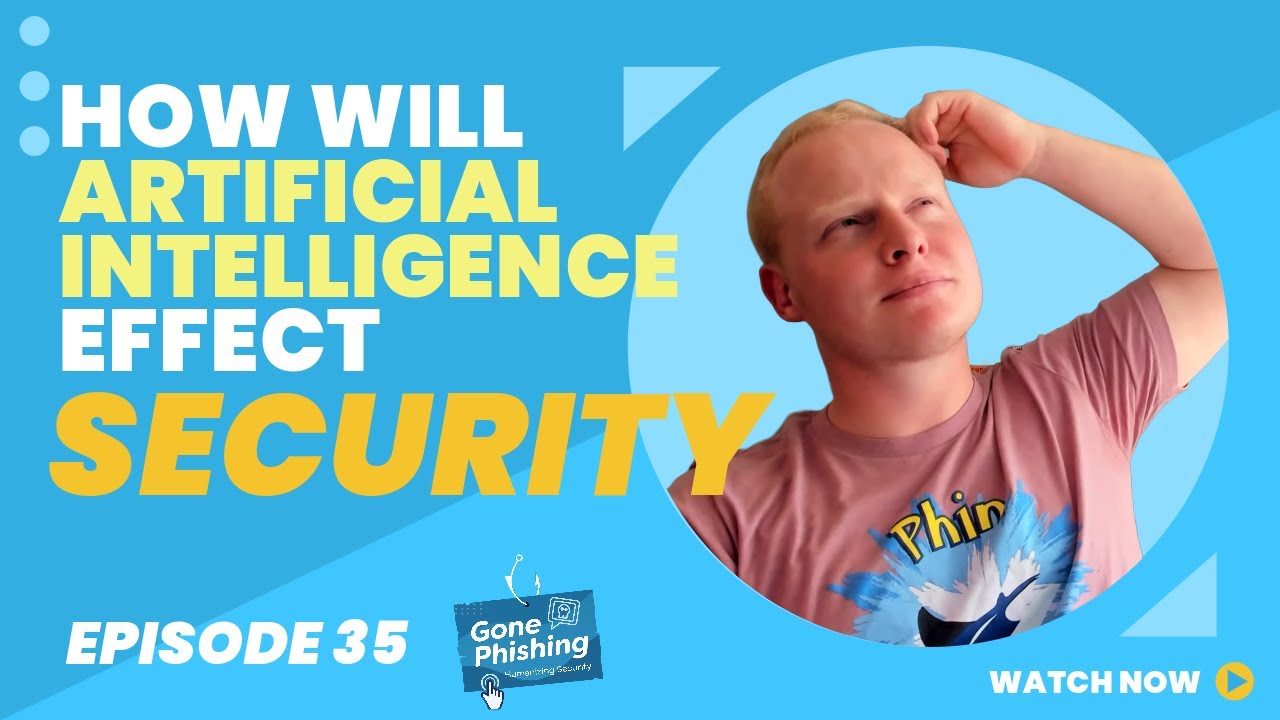


Today I am joined again by Kyle Christensen in this episode, we discuss the impact of AI on our intelligence. AI is a tool that can make us more efficient and for some more creative. It can automate routine tasks and free up time for more important pursuits. However, AI cannot replace human critical thinking and creativity. It is up to us to use AI wisely to achieve our goals without becoming too reliant on technology.
Watch the full episode below or listen on Apple/Spotify Podcasts. (Check out more episodes on our Gone Phishing page!)
Episode 12: Listen on Apple
Full Episode 012 Transcript:
00:00:00:12 - 00:00:39:02
Connor Swalm
Welcome to Gone phishing, a show diving into the cybersecurity threats that surround our highly connected lives. Every human is different. Every person has unique vulnerabilities that expose them to potentially successful social engineering. On this show, we'll discuss human vulnerability and how it relates to unique individuals. I'm Connor Sloan, CEO, Phin security, and welcome to Gone phishing everyone welcome back at is Connor CEO at Phin and you are listening to gone phishing and we have our friend from our last episode, Kyle Christensen here to join us now.
00:00:39:05 - 00:00:40:17
Kyle Christensen
What's up, good brother?
00:00:40:17 - 00:00:42:02
Connor Swalm
How are you? You're just good.
00:00:43:01 - 00:00:45:12
Kyle Christensen
Just okay. I'm fantastic.
00:00:45:23 - 00:00:47:13
Connor Swalm
You're fantastic.
00:00:48:08 - 00:00:51:23
Kyle Christensen
Fantastic. That is for friends that do things to kids.
00:00:52:17 - 00:01:01:06
Connor Swalm
You know, you're the first to make a SpongeBob reference. So you you get that trophy, I'll send you a trophy that I get from Amazon ever.
00:01:01:23 - 00:01:03:04
Kyle Christensen
Can I get my applause button?
00:01:03:23 - 00:01:25:19
Connor Swalm
If I had one, I did it for you. Yeah. So today we have a looming question to discuss. Will artificial intelligence make us dumber? And I feel like it's the responsible thing here to make some caveats, or at least for me, I am not an expert, nor would I ever declare myself an expert in artificial intelligence.
00:01:26:03 - 00:01:27:10
Kyle Christensen
I'm glad you clarified that for me.
00:01:27:20 - 00:01:42:17
Connor Swalm
For you. Okay, so it applies. The closest I've gotten to using artificial intelligence is like when I'm ordering from Taco Bell's mobile app and they suggest something smartly for me. I don't even know if AI's involved in that, but if they always hit the nail on the head for what I'm looking for.
00:01:42:17 - 00:01:45:07
Kyle Christensen
Do you want the cheesy quality, the crunchy? Yes, I do.
00:01:45:18 - 00:01:58:09
Connor Swalm
Who doesn't is a better question. Probably an easier question. As as the horse. I've already been beat to death, which is everybody is talking about. Chachi, what are your thoughts when I go back and forth?
00:01:58:11 - 00:02:20:06
Kyle Christensen
So one thing, my dad, he was a machinist, blue collar, hardworking mother is he always used to tell me, you have to have the right tool for the job. Now, he was saying in context of make sure you don't weld your finger to, you know, whatever you're working on and then have to go to the E.R. But it's something that's always stuck with me, right?
00:02:20:09 - 00:02:34:15
Kyle Christensen
He was definitely a guy where we didn't have a lot of money growing up, but it was, you know, I want to cry once. Don't buy some cheap thing that can only help you do 80% of the job and try to brute force the rest. So if you need the right tool or if you need to do the job, buy the right tool.
00:02:36:07 - 00:03:05:16
Kyle Christensen
And with with these things, I think there's a lot of great, really applicable places we can put this AI to make our companies, make our jobs, make our work, not necessarily easier, but make us more efficient. Right? Like when I see what Bing is doing, where it's helping you figure out your your your search algorithms that make sense to me because how many times do we just search for a basic answer to a question and we have to go click through for websites to go find it?
00:03:07:07 - 00:03:16:11
Kyle Christensen
Right. To me that that makes sense. But when you see also a lot of a lot of the concerns is, you know, well, is it going to replace jobs? Well.
00:03:17:21 - 00:03:22:16
Connor Swalm
Every industry that has replaced jobs, that's like the definition of invention. Right?
00:03:24:09 - 00:03:38:10
Kyle Christensen
Exactly right. If you look at the printing press, if you look at right, there's a bunch of monks that are terrified that, you know, their manuscripts aren't going to be purchased, that are handwritten right now. There's always a fear, right? I mean, what do you think?
00:03:39:10 - 00:04:05:21
Connor Swalm
So I think will I will I make a stuff? I don't know if that's the right way to phrase the question, but I've I've I've seen two camps. One is artificial intelligence is definitely going to replace jobs. Maybe everyone doesn't know how. You know, there's the age old saying it's like, well, you know, creating new technology. If you replace a cashier with a machine, well, then somebody has to service that machine.
00:04:05:21 - 00:04:33:12
Connor Swalm
So you and I know this is a bit of simplistic argument, but the argument is that while you haven't got rid of a job, you've replace the job with another maybe one that requires more skill. So it's like, is it a net positive for society in terms of creating jobs and whatnot is a question I've heard. And the second is more lines of what you've mentioned, which is, well, artificial intelligence is a thing, it's a tool, much like a spoon or a ladle as a tool.
00:04:33:18 - 00:05:00:17
Connor Swalm
How can we use this to create an outcome or to create as much good as possible as a society? There's a kind of like the two camps and as with every not even divisive but with any opinion, you have, there's people on both sides of the arguments. This is going to remove jobs completely. Author's Note This is going to create a new world of of society flourishing.
00:05:00:17 - 00:05:05:16
Connor Swalm
And it's, you know, it's going to create a bunch of good things. But there's people on both sides. That's what I've seen.
00:05:06:18 - 00:05:25:20
Kyle Christensen
Yeah. And, you know, I think there's also the side though, too, where for an entrepreneurial perspective, it does make you a little more of a Swiss army knife. I can tell you right now some of my clients and building their job there, their business plans. Right. We talk a lot about core values. We talk a lot about condition statements.
00:05:25:20 - 00:05:47:08
Kyle Christensen
And, you know, the real essence of stuff and especially for us tech people. Right. We're so objective or so on the on the straight and narrow is how we think the linear that some of the creative stuff becomes difficult. So the example I used with one of my clients about a month ago was we wanted to rewrite their core values and a little more of a friendly, a little more of a contextual way.
00:05:47:08 - 00:06:09:23
Kyle Christensen
And we had chat shaped like a minute, spit out seven or eight different ideas how they can rewrite their core values, statements that weren't boring and integrity and passion. Right? It was like actual cool phrases that fit the brand of their company. Yeah. Like before they might have had to pay somebody to do that or they would have had to sit there beating themselves over the head going, Hey, be creative.
00:06:10:19 - 00:06:30:22
Connor Swalm
Chartbeat is really good at getting the creative process started, but when it comes to creating a final product, much like when when it first came out, like me and my co-founder sat down, we're like, Hey, you know, we give all of our self developers a technical interview. Why don't they do well? Let's ask Jackie Beatty that question and see what they do, see what it does.
00:06:30:22 - 00:06:50:14
Connor Swalm
And it actually created a almost usable ledger, almost legible piece of code that with a very small amount of tweaking but very important tweaks would have been capable of working. That's like, wow, this didn't create the finished product. This kind of assembled all the ingredients in the right way, in the right order to almost get to a cake.
00:06:51:05 - 00:06:52:17
Connor Swalm
You're trying to bake a cake.
00:06:53:18 - 00:07:20:06
Kyle Christensen
And that's actually a really great example, right? Because so I'm a team of one and a half, maybe two, if you count my assistant. And one of the things we built inside of our notation software was I add some automation to where, you know, if I can write, I'm a talker, so I like to talk. So if I can talk into my, my phone right, to say, hey, count recapture this two, three paragraphs on something I want to talk about.
00:07:20:20 - 00:07:47:20
Kyle Christensen
We actually were able to create some automation to give me a LinkedIn post, a Twitter post, a Facebook post and a blog outline to get me started on the creative process of putting my thoughts down on paper where that normally would have taken me. Having to sit down and think of those things, write manually, do it, hope my assistant gets even closer without being a subject expert on business strategy or hired a whole marketing team to be that expert for me.
00:07:47:20 - 00:08:27:02
Kyle Christensen
Right? So it allowed me of a team of one to be more efficient. But I think our initial question right, I'm making you dumber. I think that's important on this topic, actually, because, well, it creates for you and I, who are maybe more expertize in our own ways. What about those that start to use it when they're not expertize or they don't have a level of subject experts that they that they can leverage or even like young the younger generations, is this going to inhibit their ability to learn right start creating those cognitive folds in their brain kind of like how math used to be treated back, you know, 50 years ago it was a
00:08:27:02 - 00:08:29:01
Kyle Christensen
way to influence your ability to learn.
00:08:30:23 - 00:08:31:14
Connor Swalm
Logic that.
00:08:34:13 - 00:08:44:21
Kyle Christensen
Yeah, that's why math is such an important topic in schools is it helps you learn, right? It helps you learn how to learn. It's a logic. It's order of operations. You feel like it's going to make the future dumber.
00:08:45:11 - 00:09:03:17
Connor Swalm
I don't think so. I think you've touched on I think you've touched on what's going to occur is it gives people with a narrow skill set, right? We live in in a society where people who specialize get rewarded. Right. Because you have more exposure to helping more people with that very specific set of skills kind of, you know, Liam Neeson style on the cell phones.
00:09:03:17 - 00:09:27:20
Connor Swalm
I got a very specific set of skills that I've garnered over the last 30 years. It's basically what we're doing as a society is we are specializing in helping as many people as we possibly can with that. Whereas what is access to like if you rated somebody with a specialized skill from 1 to 10, what would a really, really focused specialist be able to do if they had access to six skills, maybe at a level for a level three?
00:09:28:08 - 00:09:56:16
Connor Swalm
I think that's kind of what Chad has maybe opened just opened us up to the possibility of is people aren't necessarily getting dumber. Right. They're still really, really smart in the one specific area they have, like that specific intelligence that comes with doing that thing over and over again. But now they have access to other things where they have no intelligence because they haven't spent any time developing those skills and garnering resources, whatever you call that.
00:09:56:16 - 00:10:01:17
Connor Swalm
The something met brain manifold, what did you use?
00:10:01:17 - 00:10:03:15
Kyle Christensen
Cognitive fields, cognitive folks.
00:10:03:15 - 00:10:28:06
Connor Swalm
Right. They haven't spent any time developing cognitive faults in any area but that one specialty and now they can rely on a huge aggregate resource of data, which is transparency. And a filter I guess is the filter to kind of get access to the right answers to the right questions. I don't know. That's how I view it. It's not making this summer is making us average in ways we wouldn't ever have been average.
00:10:29:03 - 00:10:42:05
Kyle Christensen
Well, it's an interesting thought to read because if you think of like Eastern methods, right, 10000 hours, the whole art of the Samurai, the art of expert, becoming an expert at something, if you've ever heard the 10000 Hours idea.
00:10:42:12 - 00:10:44:13
Connor Swalm
Is a song by Macklemore called 10,000. Yeah.
00:10:45:01 - 00:11:03:05
Kyle Christensen
Exactly right. There is a whole logic to it. Right. That's why you have experts, swords makers and sushi do that. Right. That Jiro drinks Dreams of sushi. Right. That fantastic documentary. I think there's a level, though, what happens when you have a generation to where they are becoming experts in their own area but they have 10,000.
00:11:03:05 - 00:11:29:03
Connor Swalm
Hours of working with are I think you think you're not quite if there's a spectrum from inch wide mile deep to jack of all trades, I think we're somewhere in the middle of that where they can be interested in that. Yeah, I think they can be more knowledgeable in a wider, diverse set of skills, but they're not completely, not completely intractable.
00:11:29:03 - 00:11:49:00
Connor Swalm
So I actually wanted to tell a story that I was at an an event recently called Artificial Intelligence in Delaware HD and there was a professor at the University of Delaware, Professor Cathy McCoy, and she had a great statement on chatbot education. And I thought it kind of brings home what we were talking about today is should we be afraid of that?
00:11:49:04 - 00:12:10:11
Connor Swalm
It's just going to get rid of jobs. It's going to make us dumber. What is it going to do? And her statement was, this is a lot of educators today, specifically with chatbots being able to write almost full reports on somewhat complex subjects. Should we ban it? And I'm quoting for those should we ban it complete? There's no way to ban that from students being able to use it.
00:12:11:06 - 00:12:36:11
Connor Swalm
And I thought her her statement was really insightful and it was essentially absolutely not what we've created. And, you know, in her line of work is artificial intelligence. What we've created as a as a society or as a which she was talking about with higher education in artificial intelligence researchers, is a tool that we have now allowed people who are non-technical the ability to access, which in a lot of cases students.
00:12:37:01 - 00:13:02:13
Connor Swalm
And if we don't do everything to allow these people to allow the rest of the world to leverage this tool properly, we are repeating the same mistake that humans have made all throughout history, which is absolutely not the get rid of this. This is horrible for society. And I thought her perspective was really great is we should absolutely be we should figure out how to live in a world where students can use this profitably.
00:13:03:07 - 00:13:07:10
Connor Swalm
That was a mistake. Do you have any thoughts on that?
00:13:07:10 - 00:13:16:12
Kyle Christensen
I do. And I mean, I don't know if we have time to get into it, but it's kind of like Italy recently banning open A.I. If you saw that idea, how do you put that genie back in the bottle?
00:13:17:13 - 00:13:33:13
Connor Swalm
Let's well, let's wrap on that wrap up on that. If you could if you could make one statement, you said you had a myriad of thoughts that take us on for a very long time, probably chat about it. But what's one what's the premier one you'd like to mention?
00:13:33:13 - 00:13:50:13
Kyle Christensen
I think it goes back to what we talked about last write. Don't be afraid to try to use it right. Don't just to me the dare to suck mentality is if you can find a way in your business to use A.I. to make your employees stronger, faster, more productive. Right. It's two birds with one stone.
00:13:51:14 - 00:14:17:02
Connor Swalm
I'll rephrase it like this. If you are not using tools like that, then you are only putting yourself at a disadvantage. Who? Somebody else is going to do it? Figure it out. How to how to how to work with it. Well, Tom Kyle, it was great having you on today. I know you and I talk about this forever, so I am thankful that we were able to keep it this short.
00:14:17:03 - 00:14:18:15
Connor Swalm
So thank you. Thank you for being here.
00:14:18:15 - 00:14:20:12
Kyle Christensen
CO It's all good. I appreciate it.
00:14:20:12 - 00:14:43:21
Connor Swalm
Then also as always, I am Connor, CEO at Phin. You've been listening to Gone phishing and we'll probably have Kyle back at some point to talk about everything in between, daring to suck in artificial intelligence. So between the two, there's not many things we wouldn't be able to cover. So always, always be on the lookout. Thanks so much for tuning in to going phishing.
00:14:43:22 - 00:15:07:22
Connor Swalm
If you want to find out more about high quality security awareness training campaigns, how to launch them in ways that actually engage employees to change their habits. Then check us out. Phin Security at Phinsec.io. It's in essence that IO or like all of the wonderful names in our show notes. Thanks for visiting with me today and we'll see you next time.





